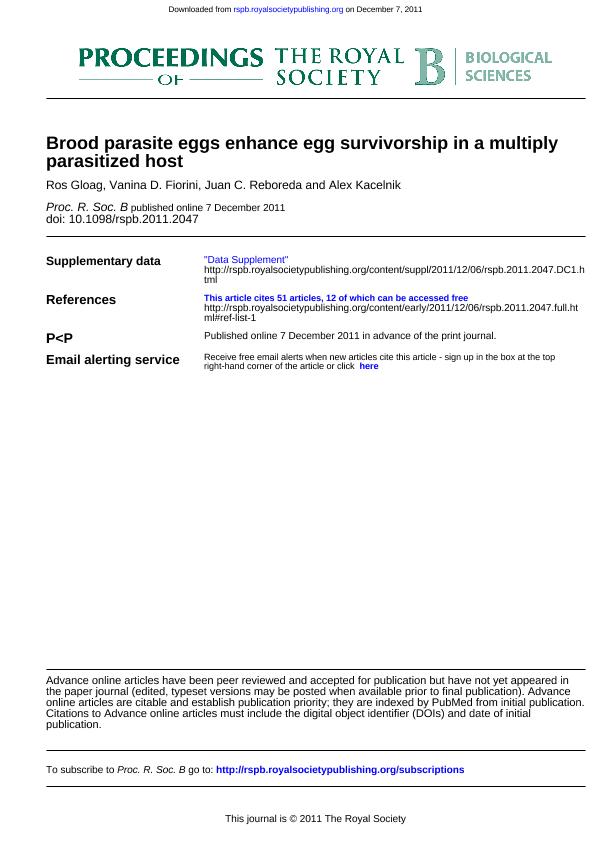Artículo
Brood parasite eggs enhance egg survivorship in a multiply parasitized host
Fecha de publicación:
05/2012
Editorial:
The Royal Society
Revista:
Proceedings of the Royal Society of London. Series B: Biological Sciences
ISSN:
0962-8452
Idioma:
Inglés
Tipo de recurso:
Artículo publicado
Clasificación temática:
Resumen
Despite the costs to avian parents of rearing brood parasitic offspring, many species do not reject foreign eggs from their nests.We show that where multiple parasitism occurs, rejection itself can be costly, by increasing the risk of host egg loss during subsequent parasite attacks. Chalk-browed mockingbirds (Mimus saturninus) are heavily parasitized by shiny cowbirds (Molothrus bonariensis), which also puncture eggs in host nests. Mockingbirds struggle to prevent cowbirds puncturing and laying, but seldom remove cowbird eggs once laid. We filmed cowbird visits to nests with manipulated clutch compositions and found that mockingbird eggs were more likely to escape puncture the more cowbird eggs accompanied them in the clutch. A Monte Carlo simulation of this 'dilution effect', comparing virtual hosts that systematically either reject or accept parasite eggs, shows that acceptors enjoy higher egg survivorship than rejecters in host populations where multiple parasitism occurs. For mockingbirds or other hosts in which host nestlings fare well in parasitized broods, this benefit might be sufficient to offset the fitness cost of rearing parasite chicks, making egg acceptance evolutionarily stable. Thus, counterintuitively, high intensities of parasitism might decrease or even reverse selection pressure for host defence via egg rejection.
Archivos asociados
Licencia
Identificadores
Colecciones
Articulos(IEGEBA)
Articulos de INSTITUTO DE ECOLOGIA, GENETICA Y EVOLUCION DE BS. AS
Articulos de INSTITUTO DE ECOLOGIA, GENETICA Y EVOLUCION DE BS. AS
Citación
Gloag, Ros; Fiorini, Vanina Dafne; Reboreda, Juan Carlos; Kacelnik, Alex; Brood parasite eggs enhance egg survivorship in a multiply parasitized host; The Royal Society; Proceedings of the Royal Society of London. Series B: Biological Sciences; 279; 1734; 5-2012; 1831-1839
Compartir
Altmétricas




